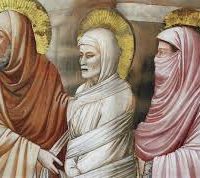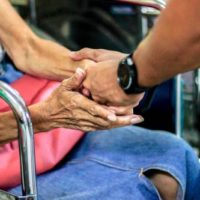Jesus is coming home. And his family is not happy. In today’s gospel story, it becomes very clear that Jesus and his family – mother, brothers, and sisters – don’t agree on his new way of life as the Son of God. He’s an embarrassment to them, tainting the family’s good name and reputation as hard-working and law-abiding people.
Until not too long ago, Jesus was just like them, living a rather ordinary life as an ordinary man, fulfilling his duties as the head of the family. Jesus led an inoffensive life. All that basically changed overnight. Jesus disappeared, maybe even without telling his folks, went to Judea and had himself baptized by this religious nut, John, and from then on roamed the countryside as a teacher and miracle healer. But that’s not all.
We are only in chapter 3 of the gospel of Mark, but Jesus has already managed to get into trouble with the religious authorities several times, mostly because of issues involving the keeping of the Sabbath.
Gossip has reached Jesus’ home region in Galilee, and his family. And those who know him agree: he’s gone mad.
That’s not only a personal matter for Jesus; in his days, family ties are extremely important. Everyone is identified through their family – or the house they are from. And ‘house’ is used here in the sense of family and dynasty – think of the British royal family, also called the ‘House of Windsor’. In the Bible, we often hear of the ‘House of David’.
Jesus gone mad makes his house, his family look bad as well. He is besmirching the family honor.
No wonder his family wants to restrain him – literally tie him up – as they get wind that he’s around. Take him home. Maybe he will come to his senses again. Maybe the family honor can be restored.
As his mother and siblings are outside of the house Jesus is staying at, and the crowds he is with let him know, ‘Listen, Jesus, your family is outside, asking for you’ – he dismisses them in the most hurtful way.
‘Who is my mother, and who are my brothers? Whoever does the will of God is my mother and my brother and my sister.’ Jesus basically disowns his own family, breaks with his own family – and redefines what family, what the ‘house’ is: ALL those who do the will God.
Jesus uses the famous phrase, ‘A house that is divided against itself cannot stand,’ as he talks about accusations by some scribes that he has the power to drive out demons by Beelzebul, the Lord of the demons himself. And Jesus is basically saying, that’s nonsense; this wouldn’t work. But it seems that he is not only talking about Beelzebul, but his very own house – his family – as well. At this point in the story, the relationship to his biological family seems broken beyond repair. This divided house cannot stand anymore.
I am sure we all know a thing or two about complicated and difficult family relationships. Even in the best families, there is brokenness, there are issues – and sometimes, they lead to divisions.
And that’s not only valid for families with biological or legal ties. This new family Jesus talks about, those who do the will of God, the church, is affected by it as well. Just look at church history. How many different churches do we have today, all of them the result of some disagreement with other siblings in the faith. We have several Lutheran church bodies in this country alone. And the divisions are not over, they continue. There are so many things we as followers of Christ don’t agree on.
We experience conflict and divisions in our own synod. Four weeks ago, the Sierra Pacific Synod assembly happened online. And among many participants, there was a feeling of disconnect on many levels. The technology that was chosen made it impossible for voting members to connect with each other on that platform – and very difficult to connect with the synod leadership. In other words, we couldn’t talk to each other. Which proved to be disastrous. Mainly because something unexpected happened during the bishop election process that left most people confused, stunned, and even angry.
This is what happened: one of the candidates running for the office of bishop – someone who, by the way, had good chances of being elected – had to disclose that allegations of verbal and emotional abuse against staff of the church he served at that time had been brought against him. He denied these allegations and in turn accused his former employers of racism (this candidate happens to be a person of color).
I shouldn’t say this about a church meeting, but after a moment of initial shock, all hell broke loose. The few people who beat the system and were acknowledged as speakers quickly expressed their dismay.
The synod leadership at that point did very little to bring light into the situation. We, the voting members, were left with guesswork and speculations. And, surprise, surprise: even without knowing any details, people took sides – and expressed their opinions. At some point, one of the people who had brought allegations against that candidate – a former intern serving under this person, a woman – spoke up, holding back tears. A person of color herself, she felt abused again by the support some attendees expressed for her former supervisor on the assumption that racism played a role in all that.
It was a mess. And it continues to be. The communities immediately affected by this situation are divided. And this division now is felt all over the synod. And who knows when there will be clarification. The outgoing bishop now has established an independent panel to look into this case.
At an impromptu meeting of the clergy here in our San Francisco-Peninsula Conference – a meeting called just to reflect on what was going down at Synod Assembly – we agreed: this church family, this house, our synod, is broken. And not just because of the incident during assembly – which only was a symptom of some deeper issues we face as the larger church, and a very diverse body of Christ.
Now we as the community at St. Matthew’s shouldn’t just gloat and point fingers at the synod. If we are honest with ourselves, we have to admit that there were incidents in the past that led to deep divisions within our immediate church family. People left because they felt hurt by their own church siblings. And even today, we don’t always agree on everything, which sometimes leads to tensions – and defections. We are all sinners. Our institutions are not perfect. Sometimes the fact we are curved into ourselves leads to the consequence that we rather follow our own desires than discern what the will of God and the good of the larger community might be.
If we are honest with ourselves, we have to admit that we all are broken. Our institutions are broken.
Now brokenness is not necessarily a bad thing. There is this beautiful song by Leonard Cohen, called ‘Anthem’. And in it, he writes, ‘Ring the bells that still can ring, forget your perfect offering. There is a crack in everything – that’s how the light gets in.’ There is a crack in everything – that’s how the light gets in.
Only those who have experienced brokenness – and acknowledged that they are broken – have the ability ‘let the light in’ – the light of God, the light that shines through our siblings in Christ. Only then do we have compassion with the brokenness of others. And that’s when healing can happen. Brokenness gives us the chance to heal.
Brokenness also gives us the chance to rebuild, or to renovate – to take an honest look at our house; to discern what elements are worth saving, and what should be improved or replaced – and to make something better out of the broken pieces.
A house divided against itself cannot stand. But that doesn’t mean it has to fall into ruins. Once it is determined what the underlying causes of the divisions are, they can be addressed and maybe even fixed. Something new can be built – even from the rubble of our broken relationships.
Jesus Christ is proof for that. He came to restore the broken relationship we have with God. And he did so by establishing a new house, a new family of the children of God. And, yes, in this new family, there even is plenty of room for his biological family: eventually, his mother Mary, his brothers and most likely sisters as well come around and become his followers. The broken relationship Jesus had with them can be saved and transformed into something new.
A house divided against itself cannot stand. However, Christ encourages us to heal and mend and repair. To not give up, but trust in a new life and new existence in God that is rooted in love, grace, and compassion. To find refuge in the House of God forevermore. Amen
This post is also available in: German



